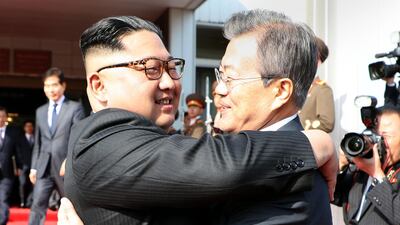When the US and North Korea first announced plans for a joint summit, the world held its breath, anticipating it was not simply a question of if, but when, it would all go horribly wrong. With two volatile leaders at the helm, it was clear it would only take a hairline trigger for any mooted deal to be off the table. In the end it was US President Donald Trump who was first to draw, announcing on Thursday, after an exchange of insults, that the June 12 talks in Singapore would not go ahead. The following day, he backtracked, saying that the meeting might be reinstated, as Kim Jong-un expressed regret at his decision to pull out and met South Korean leader Moon Jae-in on Saturday in the Demilitarised Zone. In a week with more drama than a soap opera, Mr Trump and Mr Kim appear to be playing a version of a pistol duel. Unlike a duel, however, there is much more at risk here than simply their concern for preserving their own reputations or saving face. The gamble they appear to be toying with is the security of the world at large.
Even if the June summit does go ahead, there will undoubtedly be more changed minds and heated exchanges beforehand. The past week shows just how paper-thin the veneer of civilities is; beneath them lies a deep well of mutual distrust. Yet it is remarkable that despite that, negotiations have gone as far as they have. Even as Mr Trump was calling off the summit, a select group of journalists were witnessing, at Mr Kim's behest, the demolition of Punggye-ri, North Korea's nuclear testing facility. There have been many opportunities to write off the much-publicised summit altogether; when North Korea called Vice President Mike Pence a "dummy" for comparing its proposed denuclearisation to the flawed example of Libya, for example, or when the US insisted on a full denuclearisation programme as opposed to an incremental phasing out of weapons. Yet the summit might still be salvaged. Ultimately, both leaders have much invested in making it work. Mr Trump wants to pull off the deal of the century; Mr Kim is keen to secure sanctions relief. Neither will want to lose face. For now, the pistols have been returned to their holsters. It can only be hoped they stay there, otherwise an historic opportunity will be squandered.

